- Home
- Frank Herbert
Frank Herbert Page 14
Frank Herbert Read online
Page 14
She debated between the concealment of darkness and the reassurance of light. Darkness offered some security. She moved to the switch, plunged the kitchen into darkness, and hurried to the front room.
Again she glanced at the poorly covered windows, reached for the lamp, then gasped as it went out before her fingers touched the chain.
The main switch! It was just inside the cellar door. No way to get to it without leaving the safety of the cottage.
Again the hysterical laughter grew in her throat. Safety of the cottage!
As her eyes adjusted to the darkness, she became aware again of the glow from the dying fire. For a moment a flame flickered brightly, then settled to a dull ember.
Mary stood barefoot in the center of the braided rug, head turned to catch any sound. Despite her flannel gown, she shivered, tensing every muscle against the chill and the fear.
She could almost touch the silence and the dark.
Three heavy blows struck the door. Mary felt each in her chest as if she had been hit.
Oh, God! There he is! She stared toward the dark-hidden door. The heavy knocks came again—then a voice.
“Hello, Mrs. Cloister! Are you home?”
With a gasp of relief, Mary recognized Brett’s voice. But what was the grocer doing outside her door at midnight?
She crept to the door, peered through the little window. Automatically she flicked the switch for the porch light before remembering she had no electric power.
“Yes?” she called. “What is it?”
“It’s me,” said the friendly voice. “Mr. Brett from the store. Are you all right?”
“My lights and phone are out,” Mary shouted through the door. “Can you call someone for me?” Dimly, she could make out the white shadow of his face—so like Willy—yet so importantly different, with the light of intelligence in his eyes.
“Can I come in?” he asked. “Maybe I can fix them up for you.”
She answered with a question: “What are you doing here?”
“Saw Willy coming this way. Thought I better check. You all right? Better let me come in and look around.”
Her hand moved toward the doorknob. She jerked it back. “I’m not dressed.”
“Better let me in,” Brett persisted. “I could check around for you.”
She didn’t like his insistence. “No—no, thank you. If you’d just phone someone for me, that would be enough.”
He rattled the knob, and she jumped away from the door.
“Open the door,” he said. “You shouldn’t be all alone and scared.”
“I’m all right,” she called.
Again the knob rattled. “Open up!” he demanded.
She gasped. “Please. Please go away.”
Then, incredibly, she heard the sound of a key being fitted into the lock.
She moved as quickly as she could in the darkness, felt her way into the bedroom, and eased the door closed.
The black–and-white cat mewed angrily as her foot hit against the bed.
“Hush!” she said sharply, straining for any sound from the living room. Yes. There it was. The slight creak of footsteps, then a crash as Brett ran into the rocking chair.
He cursed angrily, gave the chair an audible push.
Mary shuddered, furious with herself for not running for the kitchen with its back door.
She felt her way around the bed, shaking the black-and-white cat. He protested loudly.
Oh, damn that cat! She thought. The least disturbance sets him off.
A dim light showed under the bedroom door. He must be using a flashlight now, she thought.
She groped with trembling hands for her robe, slipped into it. She could hear him fumbling at the knob of the bedroom door.
He swung it open.
The flashlight beam blinded her; she blinked away from it.
Her voice sounded steadier than she expected. “What are you doing in my house?”
“I’m awful sorry to scare you, Mrs. Cloister,” Brett said in a soft voice. “But you shouldn’t be here all alone. That Willy can be dangerous.”
“You told me your brother was harmless,” she said, her mind racing. Keep him talking, she told herself.
Brett chuckled softly. “Willy takes spells,” he said.
She could just see the outlines of his face behind the light. “Why do you have a key to my house?” she demanded.
“Lady who was here gave it to me,” he said.
Fear rose in her throat like gall as she remembered Willy’s tale of the lady that was choked. “You said a man lived here.”
Brett shifted the light to his left hand, took a step into the bedroom. “Did I? Well, maybe before him, she was.”
Mary forced her voice steady. Don’t let him stop talking. “It was you who left the dog on the patio, wasn’t it? Why did you do it?”
Brett cleared his throat. “It was sort of a little lesson. Wanted to show you bad things can happen when a woman’s all alone.”
Suddenly he turned his head toward the darkness of the living room. She heard the sound that had distracted him: footsteps. Hope grew in her mind like a light.
“Who’s there?” he asked, his voice shrill.
“Just Willy,” said a deep voice from the darkness.
The hope died. She wanted to cry. Now there were two of them. How could she get around Brett and past his half-witted brother?
“You get out of here, Willy,” Brett said. “Go home.”
“I just want my cat,” Willy said. Then, as if suddenly noticing, he added, “Why’s it dark?”
Brett seized on this excuse. “Willy,” he said in a gentler voice. “You take this here flashlight and you go down cellar and turn on the lights. There’s a switchbox down there.”
“Willy, wait!” Mary cried. Anything was better than being left alone with Brett. “Wait, Willy! You have to help me.”
“Where’s my cat?” Willy persisted.
“Willy!” she said. “You have to help me. Your brother’s the one who killed that pretty little dog.”
“Where’s my cat?” Willy demanded.
“Damn it!” Brett snapped. “How do you expect to find your cat in the dark, you dummy?”
Willy moved close to his brother, another dark shape behind the flashlight. “Give me the light,” Willy said. He took it and moved away toward the door.
Brett followed swiftly, a gross shadow. The front door slammed, and she heard the lock snick closed.
In the deeper darkness after the light, Mary plunged toward the bedroom door.
But Brett was quicker. She rushed into him in the doorway, felt her arms seized in a strong grip.
He pulled her against him, released her left arm to embrace her. “There, there,” he said. “Don’t be scared. I’m right here.”
His face came closer. She smelled whiskey and tobacco. She tried to twist away, felt the wet touch of his lips against her cheek.
What can I do? She asked herself as she tried to push away and found herself ineffective against his rough strength. Her knees felt like rubber.
Do I dare hurt him? She wondered. If I kick or scratch, could I hide in the dark house? Or would it be better to play up to him—wait for my moment of escape? Or would that just make him angry and murderous?
She felt his hand move on her back up to her head, force her face toward his.
The living room lamp sprang on behind him, silhouetting them in the square of light from the doorway.
She could see his face, heavy lips wet with passion, the little blue eyes glittering. He blinked in the light and said, “Damn!” His grip relaxed.
In a burst of revulsion, she forced herself free, stumbled backward till the bed hit the back of her legs. “Get out of here!” She almost screamed the words. The black-and-white cat on the bed meowed in protest.
Brett arranged his face in what he must have thought a pleasant expression. “Now, what’s wrong with me?” he asked. “A widow needs a man now and then.
”
“Get out!” She looked around for a weapon, regretted she had left the piece of firewood in the kitchen.
The black-and-white cat snarled angrily as she pressed backward around the bed. Her foot kicked a shoe. She wondered if she could distract Brett long enough to get her hands on the shoe—use its spike heel for a bludgeon.
He took a step toward her, and she spoke quickly. “What happened to the woman who lived here before I did?”
Brett shook his heavy head. “What’s wrong with me?” he asked. “Am I so ugly?”
With one toe, she moved the shoe from under the bed, kept her gaze on his little blue eyes. “No,” she lied, trying to smile. “I wouldn’t call you ugly.”
“She did,” he said, and moved closer. “A woman shouldn’t live alone. I told her that. But she called me ugly.”
He’s mad! Mary thought. God help me! She forced her voice steady. “So you had to get rid of her, didn’t you?” The shoe was by her right foot now. In a second she would dip down and grab for it.
“She called me ugly,” he said again. His voice carried honest bewilderment. “I told her to be quiet. I didn’t mean her to die. I just wanted her to be quiet—and not say things like that.” Incongruously, he chuckled. “She’s real quiet now.”
Mary was afraid she would faint. “What do you mean?”
“She’s sleeping like a top,” Brett said. “Right down in your cellar.” His tone went solemn. “It’s what she would have wanted. She loved this cottage.”
From the other room came an angry rattle of the outside door. “I want my cat!” Willy shouted.
Brett’s glance flickered over his shoulder; he began to turn slowly toward the disturbance.
Mary snatched for the shoe.
But her shoulder hit the bed. The cat protested with a furious yowl.
Brett whirled back to her as she raised the shoe to strike.
He caught her wrist, shook her arm till the shoe fell to the floor.
Now Willy was pounding on the living room window. “You give me my cat!” he demanded.
“Damn dummy!” Brett muttered. “Now he’s looking in the window. A man and woman like to be alone—without some damn dummy peeking in at them.”
Mary wanted to sob but didn’t dare give way. She forced a grotesque smile. “Why don’t you make him go away?” That stupid cat, she thought.
“I’ll just close the bedroom door,” Brett said, releasing her arm and turning back to the door.
Mary focused on the cat, desperation forcing her mind to work at a furious pace.
Brett had reached the doorway.
Mary scooped up the surprised cat, hurled it at the man’s back.
The cat screamed in fury and fright, dug angry claws into Brett’s shoulders.
With a startled curse, Brett whirled a grotesque dancing circle in the doorway. He clutched for the hissing, panicky cat. Its claws tore at his shoulders. A stumbling step carried them into the living room. Brett still grappled for a hold on the black-and-white fury.
A groan of pain escaped him as he ripped the animal from his shoulders. He flung it to the floor, kicked at it as it streaked under the couch.
Mary rushed past Brett, fumbled at the front door, tore it open, shrank back as Willy confronted her.
Willy filled the doorway, the hatchet from the cellar in his hand.
Brett grabbed her, whirled her toward him, his face contorted with pain and anger. “You damn bitch!” he snarled. “You dirty little—”
His hands were at her throat.
She kicked and fought, but his grip tightened. She could sense pain and approaching unconsciousness, but abruptly she was free. The hands released her throat. Brett jerked away.
Willy! The half-wit held his brother—his strong hands restraining the other’s strength as easily as Brett had managed Mary.
Gasping for air, Mary stumbled out the front door, fled through the garden into the road.
Headlights from a car climbing the hill blinded her. She waved her arms in a frantic signal. “Help!” she screamed. “Please help me!” Oh, God! She prayed. Please be a friend.
The car skidded to a stop on the gravel, bounced with the sudden braking. The driver jumped out.
“Mary!”
It was Ron’s voice. How could it be Ron? She wondered dazedly.
“For God’s sake, what happened?” he demanded.
“Ron! Oh, Ron!” She threw herself at him. “Oh, thank God!”
He held her close. “Take it easy. I’m right here.”
“Are you real?” she asked. “Where’d you come from?”
“I didn’t like the sound of that headless dog,” he said. “I decided I’d better come up tonight instead of tomorrow.
She began to sob. “We have to get out of here. He’s—he’s out of his mind.”
“Who?” Ron held her close.
“Mr. Brett.”
A voice spoke out of the darkness beyond the headlights, “He hurt a little dog.” Willy stepped into the light, carrying the black-and-white cat cradled in his left arm. There was blood on his hands.
Mary closed her eyes, pressed closer to Ron. She remembered the hatchet.
“Who are you?” Ron demanded.
“Just Willy,” the man said, stroking the black-and-white cat. He grinned. “My brother was mean to a poor little dog. I fixed him the same way he fixed the dog.”
Mary moaned in horror. She would have fallen if Ron hadn’t held her.
Willy shuffled out of the light, walked away down the road. “He hurt my cat, too,” he announced to the night.
The Yellow Coat
[This story recently appeared in Fiction River: Pulse Pounders, WMG Publishing, 2015.]
There was a separate type of fear in each of the three men running up the open hillside in the late summer evening. They paused for a moment beside a row of rotten poles that marked an old fence line, and the way each man rested exposed his fear.
The man in the yellow coat stopped a little ahead of the others and turned, watching his companions more than he did the back trail. He was out of place here—a city man with narrow shoulders padded out by the coat and with the thin face of a drugstore diet. Even his yellow coat from a walk-up store was out of place, a bit of cheap color amidst the rich gold of the dry grass.
And this city man’s fear was of his two companions and the hills around him, which had no street signs. He was Skeeter Ricco, and his type seldom live beyond the age of thirty.
Indian Karl Daggert sat on a fallen log facing the valley, where darkness already was gathering up the shadows of the day into one mass of blackness. Anyone watching him would have said he was completely relaxed, but there was an almost imperceptible twitch to a muscle on his high, tanned cheekbone. His nightshade eyes did not waver from the way they had come.
Karl Daggert feared those who followed, for this fleeing on foot was not part of his plan.
Little Rollo Eckstrom, fat and dumpy with heavy jowls, sat in the tall grass a little lower on the hillside. The look of fear upon his face was a natural part of him. Many had seen it there. It was the mark of cowardice, which is stamped on the child and never leaves the man.
And Rollo’s fear was centered on Indian, Karl. He had seen that twitching cheek muscle before. Karl was going to kill a man. Rollo feared that it would not be Skeeter Ricco of the yellow coat. It had always been the odd man before, but this time …
Ricco tensed. “Hear that?”
They listened. From far down in the valley, across the dimming silver of the river where they had abandoned the car, the sound of baying dogs floated up to them.
“They got dogs after us, Karl.”
“Yeah, Skeeter, I hear it.” Karl rose to his feet, unfolding in angular sections. “Bloodhounds.” He looked down at Rollo. “Come along, Rollo boy. Follow papa.”
He turned and picked up a bulging leather satchel that had rested beside Ricco. “Lead off, Skeeter. I’ll carry the bag a ways.”
The man in the yellow coat turned and led the way up the hill. After a few steps, he began to speak. “I s’pose you guys are blamin’ me for not pickin’ a car that’d ride those ruts.”
Karl spat in the grass.
Behind him, Rollo remained silent, his body cold with fear—of the law that followed and the killer ahead.
Ricco continued, “Well, I ain’t never been in this country before. You oughta blame Rollo. He was born here. He shoulda warned me.”
Karl shifted the satchel to his left hand without changing stride. “Shut up,” he said. Then, half turning his head added, “What’s on the other side of the ridge, Rollo?”
The little man swallowed the dryness in his throat. “Hedgehog Creek. Say, Karl! There’s a limestone cliff on the other side and some caves. Maybe we could …”
“Creek!” The tall one stopped just below the ridgetop and turned. The others stopped with him. “Use your head, fat boy. If that creek’s big enough, those dogs don’t mean a thing to us.” He listened a moment to the sound of the baying, seemingly louder now. “Come on! Let’s get to that water!”
They hurried over the crest.
Once below the ridgetop, shadows enveloped them. Fallen logs and thickets of salal and salmonberry became a dark mass through which they threaded their way. Halfway down the hill, they hit a trail slanting to the right. Through the open trees above them, a dusky half-light showed the pathway leading down into deeper darkness.
Rollo, in fear of Karl slowing his steps, was twenty feet behind the others when he reached the trail. He was just in time to see Karl whip a thin blade from his waistband, dart forward, and plunge it into the swaying yellow coat. Ricco pitched forward onto his face, quivered slightly, and was still.
An almost audible sigh of relief escaped Rollo’s lips. He waddled up, his hand on the .38 in his pocket.
Karl faced him, standing over the fallen man, the knife in his hand strangely devoid of any blood.
“He got us into this,” Karl was saying. “Now he can get us out. The dogs’ll wait here and hold up the men while we get away. Come along.”
Rollo waited, his fingers still damply clutching the gun.

 Direct Descent
Direct Descent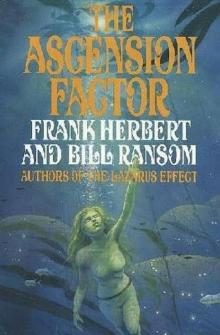 The Ascension Factor
The Ascension Factor The Heaven Makers
The Heaven Makers Children of Dune
Children of Dune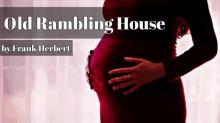 Old Rambling House
Old Rambling House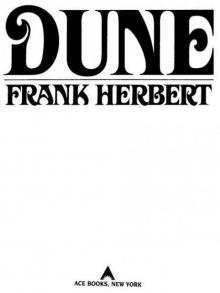 Dune
Dune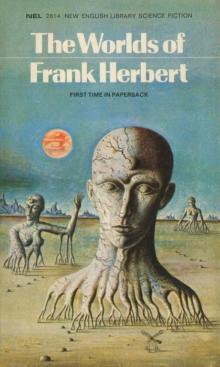 The Worlds of Frank Herbert
The Worlds of Frank Herbert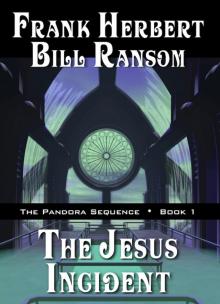 The Jesus Incident
The Jesus Incident Heretics of Dune
Heretics of Dune Whipping Star
Whipping Star Dune Messiah
Dune Messiah Man of Two Worlds
Man of Two Worlds The Book of Frank Herbert
The Book of Frank Herbert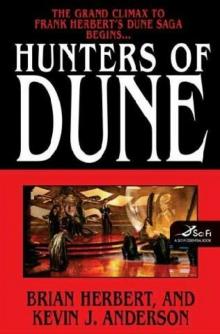 Hunters Of Dune
Hunters Of Dune The Tactful Saboteur
The Tactful Saboteur Soul Catcher
Soul Catcher God Emperor of Dune
God Emperor of Dune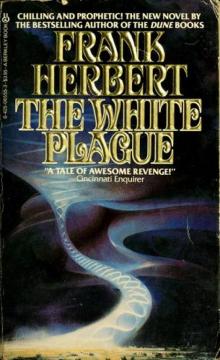 The White Plague
The White Plague The Green Brain
The Green Brain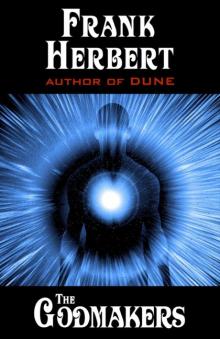 The Godmakers
The Godmakers Sandworms of Dune
Sandworms of Dune Destination Void
Destination Void The Dosadi Experiment
The Dosadi Experiment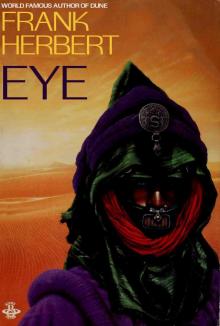 Eye
Eye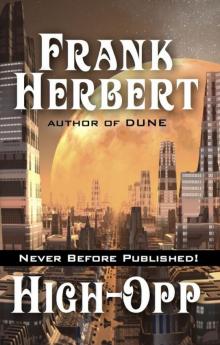 High-Opp
High-Opp The Eyes of Heisenberg
The Eyes of Heisenberg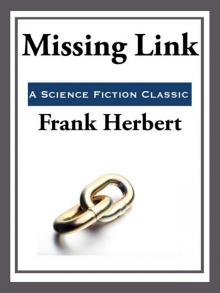 Missing Link
Missing Link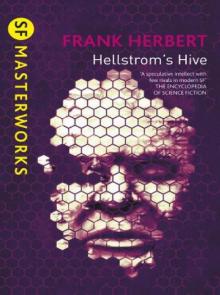 Hellstrom's Hive
Hellstrom's Hive Chapterhouse: Dune
Chapterhouse: Dune The Santaroga Barrier
The Santaroga Barrier The Dragon in the Sea
The Dragon in the Sea Operation Haystack
Operation Haystack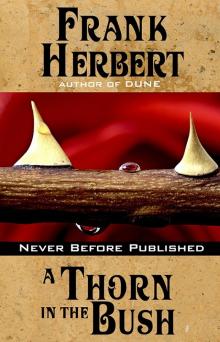 A Thorn in the Bush
A Thorn in the Bush Four Unpublished Novels
Four Unpublished Novels Dune dc-1
Dune dc-1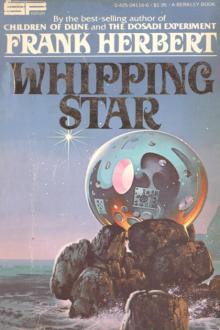 Jorj X. McKie 1 - Whipping Star
Jorj X. McKie 1 - Whipping Star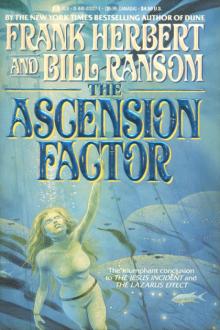 DV 4 - The Ascension Factor
DV 4 - The Ascension Factor Frank Herbert - Dune Book 4 - God Emperor Of Dune
Frank Herbert - Dune Book 4 - God Emperor Of Dune ChapterHouse: Dune dc-6
ChapterHouse: Dune dc-6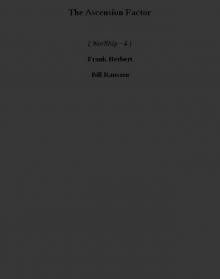 The Ascension Factor w-4
The Ascension Factor w-4 A Game of Authors
A Game of Authors Children of Dune dc-3
Children of Dune dc-3 Destination: Void: Prequel to the Pandora Sequence
Destination: Void: Prequel to the Pandora Sequence The Collected Stories of Frank Herbert
The Collected Stories of Frank Herbert Dune Messiah dc-2
Dune Messiah dc-2 Frank Herbert - Dune Book 5 - Heretics of Dune
Frank Herbert - Dune Book 5 - Heretics of Dune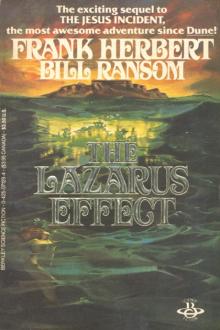 DV 3 - The Lazarus Effect
DV 3 - The Lazarus Effect The Jesus Incident w-2
The Jesus Incident w-2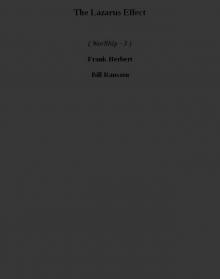 The Lazarus Effect w-3
The Lazarus Effect w-3 Frank Herbert
Frank Herbert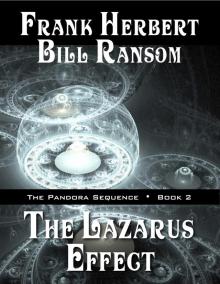 The Ascension Factor: Pandora Sequence
The Ascension Factor: Pandora Sequence Dune (40th Anniversary Edition)
Dune (40th Anniversary Edition) The Dosadi Experiment c-2
The Dosadi Experiment c-2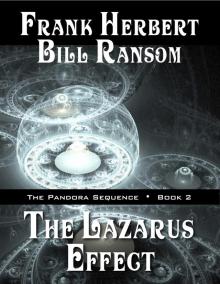 The Lazarus Effect
The Lazarus Effect God Emperor of Dune dc-4
God Emperor of Dune dc-4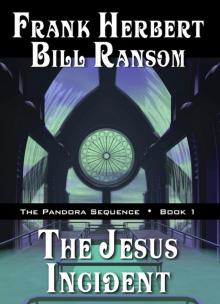 The Pandora Sequence: The Jesus Incident, the Lazarus Effect, the Ascension Factor
The Pandora Sequence: The Jesus Incident, the Lazarus Effect, the Ascension Factor The Green Brain (v4.0)
The Green Brain (v4.0) The Heaven Makers (v4.0)
The Heaven Makers (v4.0) Heretics of Dune dc-5
Heretics of Dune dc-5